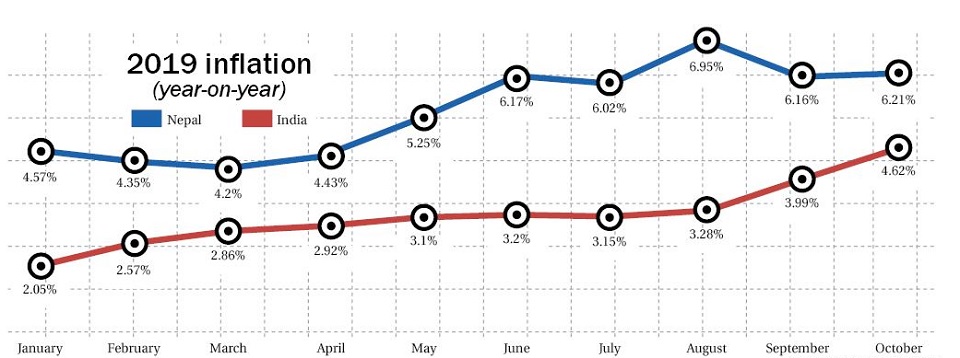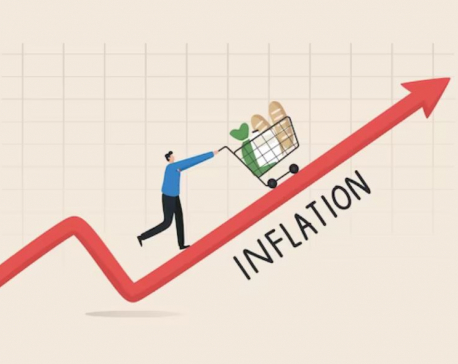
OR
Inflation outpaces govt target, jumps to 6.44%
Published On: November 22, 2019 09:00 AM NPT By: Republica | @RepublicaNepal

Higher inflation in India, increasing labor cost, and supplies constraints blamed
KATHMANDU, Nov 22: Though the government has vowed to tame inflation at 6% in the current fiscal year – FY2019/20, consumer price rise has outpaced the government’s target.
Releasing the ‘Current Macroeconomic and Financial Situation of Nepal (Based on Three Months’ Data of 2019/20)’ on Thursday, the Nepal Rastra Bank (NRB) said that the average inflation, as measured in consumer price index (CPI), stood at 6.44% in the first three months of the current fiscal year.
In its budget speech for the current fiscal year, the government has said that the inflation will be kept below an average of 6%. In line with the government’s policy, the NRB has also set a target of taming the inflation at 6%.
The inflation, which remained subdued for a long time, started to rise in the last months of the last fiscal year 2018/19. Soaring prices of foods and vegetables during the Dashain festival has also driven up inflation in the review period, according to NRB officials.
Data released by the central bank shows that the year-on-year consumer price inflation jumped to 6.21% in mid-October 2019 compared to 4.68% a year ago. Food and beverage inflation stood at 7.04%, whereas non-food and service inflation stood at 5.55% in the review month.
NRB officials attribute the rising prices in India to the inflationary pressure in Nepal.
“If you see the data in India, the consumer price inflation has reached a 16-month high of 4.62%. As Nepal’s two-thirds of imports are from India, the rise in prices there has direct impact in our markets,” Gunakar Bhatta, an executive director at the NRB, told Republica.
He also said that rising salary and wages have also driven up inflation in recent months. “Salaries and wages of private sector and government employees have gone up. When the cost of labor increases, companies pass it on to their consumers,” said Bhatta, who heads the Research Department of the NRB.
The year-on-year salary and wage rate index increased by 12.07% in the review month compared to 8.73% a year ago. In the review month, salary index and wage rate index increased by 13.56% and 11.67%, respectively.
Another factor pushing up prices in recent months is recent restriction imposed by the government on certain imports. While Bhatta did not acknowledge it as a direct factor triggering higher inflation, he said that the supply constraint could have a contribution in the price hike.
“The inflation pressure is mainly due to the supply constraint. The imports of some products like vegetables and meat products were affected. Similarly, domestic vegetable harvest was hit by the floods and low rainfall during plantation. These all accelerated the prices,” he added.
According to the NRB data, vegetable inflation rose by 16.83%, while meat and fish prices jumped 8.31%.
You May Like This

Why Consumer Confidence Is Key to Bringing Down Inflation
The global economy devastated by the Covid-19 pandemic and Russia Ukraine war was somehow recovering since the beginning of this... Read More...

Federalism: learning by doing
Issues have emerged regarding effective implementation of federalism. But there is a long way to go and these issues can... Read More...

Aug 21: 6 things to know by 6 PM
Your daily dose of missed important news of the day. ... Read More...





Just In
- CM Kandel requests Finance Minister Pun to put Karnali province in priority in upcoming budget
- Australia reduces TR visa age limit and duration as it implements stricter regulations for foreign students
- Govt aims to surpass Rs 10 trillion GDP mark in next five years
- Govt appoints 77 Liaison Officers for mountain climbing management for spring season
- EC decides to permit public vehicles to operate freely on day of by-election
- Fugitive arrested after 26 years
- Indian Potash Ltd secures contract to bring 30,000 tons of urea within 107 days
- CAN adds four players to squad for T20 series against West Indies 'A'













Leave A Comment